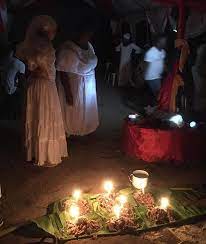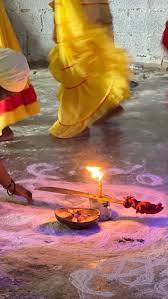Haitian Vodou, a vibrant and mystical religious practice, has captivated the curiosity of many around the world. Rooted in the history, traditions, and beliefs of the Haitian people, Vodou is an integral part of their cultural fabric. This article explores the intriguing world of haitian vodou ceremony, shedding light on their significance, rituals, and cultural importance.

The Significance of Haitian Vodou Ceremonies
Haitian Vodou ceremonies hold immense significance for practitioners, as they serve as a means to connect with the spirits and seek their guidance. These ceremonies are often held to honour the lwa, the divine spirits that are central to Vodou beliefs. Each lwa represents different aspects of human life, such as love, fertility, prosperity, and healing. Through the ceremonies, participants hope to establish a bond with the lwa, seeking their blessings and protection.
Rituals and Practices
Haitian Vodou ceremonies are characterised by a rich tapestry of rituals and practices that have been passed down through generations. The ceremonies often take place in a sacred space called a peristyle, an open-air area where the community gathers. The peristyle is adorned with vibrant colours, symbolic objects, and altars dedicated to specific lwa.
The ceremonies are led by a houngan (male priest) or mambo (female priestess), who act as intermediaries between the human and spirit realms. The houngan or mambo possesses extensive knowledge of the rituals, songs, and dances associated with Vodou.
Drumming and chanting are integral to Vodou ceremonies, as they serve to evoke the spirits and create a heightened spiritual atmosphere. Participants engage in intricate dances, often entering a trance-like state as they channel the energy of the lwa. These dances are accompanied by vibrant costumes, symbolic of the lwa being invoked.
Cultural Importance and Misconceptions
Haitian Vodou ceremonies play a crucial role in preserving the cultural identity of the Haitian people. They provide a sense of community, where participants come together to celebrate their shared heritage and express their devotion to the lwa. Vodou ceremonies are occasions of joy, reverence, and spiritual growth.
However, Vodou has been shrouded in misconceptions and misrepresented by popular culture. Portrayals of Vodou as dark or malevolent rituals have perpetuated stereotypes and fueled ignorance. In reality, Vodou promotes healing, love, and harmony with nature. It serves as a source of strength and empowerment for many Haitians.
The Role of Ancestors and Healing
Ancestors hold a significant place in Haitian Vodou ceremonies. They are honoured and venerated, as they are believed to guide and protect the living. Ancestral altars are erected, adorned with photographs, candles, and offerings, creating a space for communion with the departed.
Healing is another essential aspect of Haitian Vodou ceremonies. Vodou practitioners believe in the interconnectedness of the spiritual, emotional, and physical realms. Through ceremonies, healing rituals are performed, addressing ailments of both the body and soul. Healing practices include herbal remedies, energy work, and spiritual cleansing.
Haitian Vodou ceremonies offer a glimpse into a vibrant and intricate spiritual practice deeply intertwined with Haitian culture. By embracing their ancestral traditions, Haitians find solace, community, and a connection to their roots. Understanding the true essence of Vodou dispels misconceptions and allows for a deeper appreciation of its significance in Haitian society. As we explore the rich tapestry of world religions, the Haitian Vodou ceremony stands as a testament to the diversity and beauty of human spirituality.

















